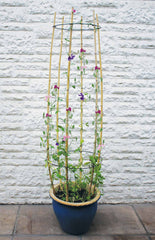Sweet peas are gorgeous fragrant climbing plants that are great as cut flowers and a treat for the pollinators on your plot. They grow well in the garden or in pots if you don't have much space.
Read on for help selecting your sweet pea variety. If you have already chosen and want to skip ahead, use one of these links to find what you are looking for
How to get Sweet Peas to germinate
The Secret of Growing Sweet Peas - how to plant
Best Time to plant out Sweet Peas
How to Support Sweet Pea Plants
Which Sweet Pea Varieties to choose
Some sweet peas are annuals (last just one season) and some are perennials meaning that they will come back year after year.

So that is your first choice - are you happy to replant each year? The pay off if you do is that the annuals are nearly all beautifully scented. There are a couple of scented perennials - Lathyrus nervosus, Lord Anson's Pea, and Lathyrus pubescens but generally you will sacrifice the delicious scent if you go for perennials.
Your second choice is colour. There are many gorgeous mixed seeds available for the country garden feel. Or you can get a big range of single colours if you have an area you want to be in a specific colour.
Lastly, its about where you want them to grow. Most are climbers so need support - we have some great ideas for this further down. But there are also dwarf varieties and clumping varieties that don't need the support.
Sowing Sweet Peas
Sow annual sweet peas from October to December to get nice early blooms the next Spring. Or from mid January to April to get summer flowers.
How to get Sweet Pea seeds to germinate
The seeds have a hard seed coat so germination rate is sometimes low. There are ways to aid germination though so try them and see what works for you. Options include
- you can just trust them to germinate and plant them straight out of the packet (see how below)
- place your seeds on a layer of moist vermiculite or kitchen tissue in an airtight container in a warm room. Sow them as soon as they swell or begin to sprout.
- soak the seeds overnight - they then need to be sowed immediately or they can rot.
- nick the seed with a sharp knife avoiding the 'eye' (small, round mark) then plant

The Secret to Growing Sweet Peas
However you do, or don't, treat your seeds, Sweet Peas have long roots and dislike root disturbance so by far the best way to grow them is in Deep Rootrainers. You can sow them direct into the ground but it will be less successful.
We can't stress this enough. If you see anyone growing amazing sweet peas then its a certainty that they are using Rootrainers to do it.
Can I plant Sweet Peas in Toilet roll middles?
Technically, you could try this. And it might work at a pinch for Spring planted seeds but if you plan to plant in November and overwinter them, then by the time spring comes you will have a soggy disintegrated mess that will disturb the roots and delay growth. Even, spring planted seeds will have a better root structure due to the directional ridges in the Rootrainers. This allows them to establish quicker and makes them more resistant to drought and disease,
How to Plant Sweet Pea Seeds
Fill the Rootrainers with good quality, peat-free compost and add 1 or 2 seeds per cell. Cover with 1cm (1/2") compost or vermiculite. Water well, cover with the lid provided and place in a cold frame or greenhouse.
If you are planting in Autumn/ Winter then ensure that you have somewhere where they can grow protected from the frost until spring. A Compact Grower Frame is an affordable way to do this. Or a Light-Booster Cold frame or Plant House would work and give them the extra light they need to start growing earlier in Spring.
Pinch out the tips of the plants when they have 4 sets of real leaves and reach about 8-10cm (3-4") tall. This will encourage bushy growth.
When to Plant Sweet Peas Out
Once all risk of frost has passed you can plant out your sweet pea seedlings. This is usually mid to late May depending where you are. They need to be hardened off for a week or two before you plant them out. Do this by putting them out in the day and taking them back in to a frost-free place at night.

If you have 2 or 3 per cell then don't worry about separating them. They can be planted together. However, if you have bought them from a garden centre you may find 10 plants per pot. If this is the case then it is best to tease them apart a little and plant in 2s or 3s.
How to Prepare the Bed for Sweet Peas
About a month before planting make sure the soil is good by adding some compost or well rotten manure and digging it in before planting. Then plant them 5-8cm (2-3") from your supports and water them very well. They will need tying in for the first 5 or 6 weeks. After that most varieties will have grabbed your support and be away.
Continue to water well to get them fully established.
How to Support Sweet Pea Plants
Most sweet peas will grow to about 2m in height so support is essential. 
They can climb up natural supports like trees and can vastly improve ugly fences. But many gardeners simply make a wigwam of bamboo canes for them to climb up. If you would like to do this then Cane Rings are the ideal thing to help keep your canes in place. They are also a great way to support sweet peas grown in containers.

Another way to support them is with a Garden Maypole. You can grow your own living maypole on your plot!
If you really want to make a statement then how about an architectural frame? You could mix sweet peas with veg such as beans, peas, pumpkins, etc. and be the envy of your neighbours! We have a choice Big Ben, Eiffel Tower or London Eye
How to look after Sweet Peas
A soon as your sweet peas start flowering start feeding with a high potash fertiliser, such as tomato food. Pick regularly to encourage more flowers and prevent them from setting seed. If you do this they can last all the way through to September.
Growing Sweet Peas in containers
Continue to water any growing in pots, and both pots and garden grown during very dry weather. If you notice flowers dropping this is a sign that the plants need more water. In particularly dry years add a 10cm mulch of organic matter to the entire root area and water well.
Cutting Back Sweet peas and Collecting Seeds
After flowering, if you are growing perennial sweet peas you can either cut them back to ground level in autumn or leave them in place over winter to provide a habitat for wildlife. Then cut them back to ground level in February.
For annuals, in September collect the seeds (pods will be dried and papery looking), dry and store in a paper bag for next year. Then pull out and compost the plants or leave as a habitat if you don't mind looking at them.
Sweet Pea Garden Pests & Diseases
Young plants are attractive to slugs & snails. You can combat this by making sure the soil is warm enough when you plant for the young plants to establish and grow quickly.
Gardening inspiration
If you are bitten by the flower growing bug then how about growing a flower that will also give you a delicious crop? Jerusalem artichokes are a member of the sunflower family and will give you an abundance of lovely yellow flowers and edible tubers. Check out how to grow them here Guide to Growing Jerusalem Artichokes
Another thing you can do, once your sweet peas are planted is to use your Rootrainers to grow some Climbing beans (they also hate root disturbance)


Comments
Thank you for the very useful tips on growing sweet peas. I have bought one of your Deep Rootrainers to use for my sweet peas this year. I wondered why you recommend using multipurpose compost rather than seed compost?